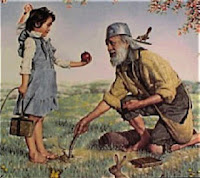
(Because I missed the
actual day earlier in March!)
John Chapman, better
known as Johnny Appleseed, was a pioneer nurseryman during the days of the great
American frontier. He was an eccentric
but kind and generous personality, and has become a dearly loved legend,
respected for his love of the land and all living things, his leadership in
conservation, and his missionary work with The New Church. But most of all, he is remembered for his
apple trees.
 Born in 1774 in
Massachusetts (around the time of the Battle of Bunker Hill; his father,
Nathaniel Chapman, served in the Continental Army under George Washington in
the Revolutionary War), John Chapman went west at the age of 18. As a boy, he was started on his career as an
orchardist through an apprenticeship to a Mr. Crawford, who had apple orchards. There are many tales about the path Johnny's
life took, where exactly he lived and traveled, and the popular image is of
Johnny scattering apple seeds randomly as he walked. But in truth, he planted nurseries along his
way, leaving them in the care of a neighbor who then sold the trees for him on
shares, and returning every few years to tend his trees. In this way, Johnny introduced apple trees to
large parts of Pennsylvania, Ohio, Indiana, and Illinois.
Born in 1774 in
Massachusetts (around the time of the Battle of Bunker Hill; his father,
Nathaniel Chapman, served in the Continental Army under George Washington in
the Revolutionary War), John Chapman went west at the age of 18. As a boy, he was started on his career as an
orchardist through an apprenticeship to a Mr. Crawford, who had apple orchards. There are many tales about the path Johnny's
life took, where exactly he lived and traveled, and the popular image is of
Johnny scattering apple seeds randomly as he walked. But in truth, he planted nurseries along his
way, leaving them in the care of a neighbor who then sold the trees for him on
shares, and returning every few years to tend his trees. In this way, Johnny introduced apple trees to
large parts of Pennsylvania, Ohio, Indiana, and Illinois. Though apples grown from seeds aren't typically the sweet, fresh-eating apples we think of today, the small sour apples his trees produced were popular among settlers for baking and making hard cider.
 The only surviving
tree, according to the American Forests' Historic Trees program,
is located on a farm in Nova, Ohio. Most
agree that the tree is a Rambo variety, introduced to American in the
1640's. The fruit ripens in September
and is a cider or baking/applesauce variety of apple. Cuttings of the "Johnny Appleseed
Tree" are grafted onto rootstock and young saplings are available through
nurseries, such as Raintree Nursery.
The only surviving
tree, according to the American Forests' Historic Trees program,
is located on a farm in Nova, Ohio. Most
agree that the tree is a Rambo variety, introduced to American in the
1640's. The fruit ripens in September
and is a cider or baking/applesauce variety of apple. Cuttings of the "Johnny Appleseed
Tree" are grafted onto rootstock and young saplings are available through
nurseries, such as Raintree Nursery.
Planting a Johnny
Appleseed Tree is a wonderful way to keep the spirit of one of America's
greatest legends alive, and remember the role agriculture played in the
settling of the great American frontier.
Plus, it's an excellent conversation starter, with botanists and
historians alike!

No comments:
Post a Comment